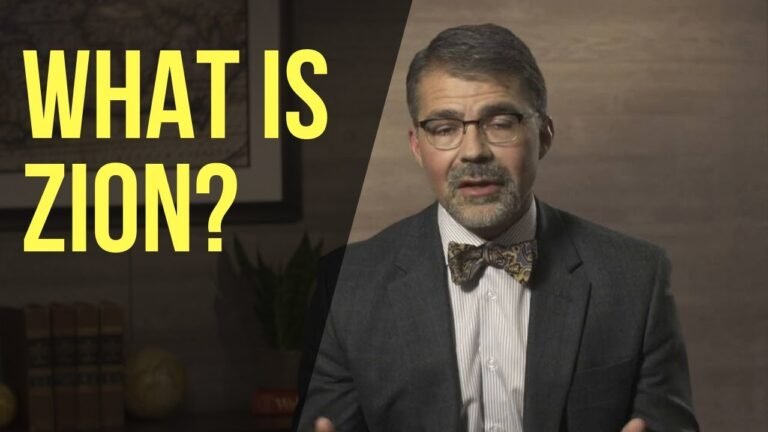Understanding the Biblical Meaning of Zion
The term Zion holds profound significance in the Bible, representing not only a physical location but also a powerful symbol of hope, divine promise, and spiritual refuge. Often associated with Jerusalem, Zion embodies the heart of God’s covenant with His people, serving as a beacon of faith and a promise of redemption. Understanding the meaning of Zion in biblical context enriches our appreciation of its role in religious texts and its enduring impact on spirituality and culture throughout history.
What does Zion fully mean?
Zion holds profound significance in religious and historical contexts, primarily rooted in its connection to Jerusalem. As a hill within the city, it symbolizes both a physical location and a spiritual ideal. The term has transcended its geographical origins to embody a broader meaning, often representing a “holy place” or a “kingdom of heaven,” making it a powerful emblem in various faiths.
In Judaism, the concept of Zion is deeply intertwined with themes of hope, redemption, and the longing for a promised land. The Hebrew term Tsiyon not only refers to the specific hill but also evokes a sense of collective identity and aspiration among the Jewish people throughout history. This yearning for Zion has been a central motif in religious texts, prayers, and cultural expressions.
Beyond its roots in Judaism, Zion has also been embraced in Christian and Rastafarian traditions, where it signifies a utopian vision or a place of peace and unity. This multifaceted meaning allows Zion to resonate with diverse communities, fostering a sense of belonging and purpose. Ultimately, Zion symbolizes the aspiration for a sacred space where individuals can connect with the divine and with each other.
What promise does God make to Zion?
God’s promise to Zion is a profound assurance of restoration and sanctity. In the fullness of time, the Lord will initiate the construction of the City of Zion, transforming Jerusalem into a holy city. This divine plan includes a cleansing process, ensuring that it becomes a sacred habitation for the Jewish people, who will embrace Jesus Christ as their Redeemer.
This promise signifies hope and renewal, as it emphasizes the importance of spiritual readiness and acceptance. The envisioned transformation of Jerusalem is not merely physical but also spiritual, reflecting a deep commitment to faith and redemption. Ultimately, this covenant embodies the belief in a future where the city will thrive as a beacon of holiness and unity for its people.
What makes Zion significant to God?
Mount Zion holds profound significance as the dwelling place of Yahweh, the God of Israel, symbolizing His sovereignty and presence among His people. It is not only the throne from which He reigns, as highlighted in Isaiah and Psalms, but also the site where He established King David, marking it as the epicenter of divine authority and historical action. This sacred mountain represents the intersection of God’s purpose and His relationship with humanity, making it a cornerstone of faith and hope for believers.
Discovering the Spiritual Significance of Zion
Zion holds a unique place in both historical and spiritual narratives, often regarded as a symbol of hope and refuge. For many, it represents not just a geographical location, but a profound spiritual journey. The mountainous terrain and breathtaking landscapes evoke a sense of peace and connection to the divine, drawing individuals seeking solace and enlightenment. As a result, Zion has become a pilgrimage site for those yearning to explore their faith and deepen their understanding of spirituality.
The spiritual significance of Zion transcends mere physicality; it serves as a metaphor for the journey of the soul. In various religious traditions, it embodies the quest for a promised land, a place where believers can find unity and strength. This notion resonates deeply with those facing personal challenges, inspiring them to seek their own ‘Zion’—a state of mind that embodies tranquility, resilience, and faith. The teachings and stories associated with this sacred place encourage reflection and foster a sense of community among diverse groups.
Visiting Zion offers more than just natural beauty; it provides an opportunity for introspection and growth. As individuals walk its trails and absorb the awe-inspiring vistas, they often find themselves contemplating their own life paths and spiritual beliefs. This transformative experience highlights the importance of nature in nurturing the human spirit and reinforces the idea that sacred spaces can awaken a deeper understanding of oneself and the universe. Through these revelations, Zion continues to inspire countless souls on their quest for meaning and connection.
Unpacking Zion: A Journey Through Scripture
Zion has long been a symbol of hope, promise, and divine presence throughout the scriptures. From its roots in ancient texts to its modern interpretations, the concept of Zion transcends geographical boundaries, embodying a spiritual sanctuary for believers. This journey through scripture invites us to explore the multifaceted nature of Zion, revealing its significance not just as a physical location, but as a profound metaphor for faith, community, and redemption.
As we delve deeper into the biblical narrative, Zion emerges as a place where heaven meets earth, a city of refuge where God’s covenant with His people is celebrated. The Psalms resonate with the joy and reverence associated with Zion, painting it as a beacon of divine favor. By understanding its historical context—from the establishment of Jerusalem to the prophetic visions of a restored Zion—we gain a richer perspective on how this sacred space continues to inspire and guide spiritual journeys today.
Ultimately, unpacking Zion invites us to reflect on our own personal connections to faith and belonging. It challenges us to consider how we can cultivate our inner Zion, a place where love, justice, and compassion flourish. As we navigate the complexities of modern life, the lessons drawn from Zion remind us of the enduring power of hope and the importance of nurturing our spiritual lives, encouraging us to build communities that reflect the principles of peace and unity exemplified in the scriptures.
The Historical and Theological Roots of Zion
Zion, a term steeped in historical and theological significance, traces its origins to ancient Jerusalem and the biblical narrative that intertwines faith, identity, and land. Rooted in the Hebrew scriptures, Zion symbolizes not only the physical hill where the Temple once stood but also the spiritual aspirations of the Jewish people throughout centuries of exile and yearning. The concept evolved, influencing various religious traditions and becoming synonymous with hope, redemption, and the ultimate return to a promised land. This rich tapestry of meaning continues to resonate today, shaping the collective consciousness and aspirations of communities worldwide, making Zion a powerful emblem of faith and resilience.
Finding Hope and Identity in the Concept of Zion
In a world often marked by uncertainty and division, the concept of Zion emerges as a powerful beacon of hope and unity. For many, Zion represents not just a physical place but a profound sense of belonging and purpose. It embodies the aspiration for a community where individuals can find solace, embrace their identities, and foster connections that transcend cultural and geographical boundaries. This vision inspires a collective journey towards a more harmonious existence, encouraging people to seek out their roots and engage in the shared pursuit of peace and understanding.
At the heart of this journey lies the exploration of identity, as individuals grapple with their personal narratives and cultural heritage. The concept of Zion invites reflection on what it means to be part of a larger whole while celebrating the unique stories that shape each person. By embracing these diverse identities, communities can cultivate resilience and strength, fostering an environment where hope thrives. Ultimately, the quest for Zion becomes a transformative experience, guiding individuals towards a brighter future filled with possibility and connection.
The meaning of Zion in the Bible transcends its geographical roots, symbolizing a profound spiritual connection and a promise of hope and redemption. It serves as a reminder of the enduring strength of faith and the unbreakable bond between the divine and humanity. As believers continue to explore its significance, the concept of Zion remains a powerful beacon, inspiring countless individuals to seek a deeper understanding of their spiritual journey.







